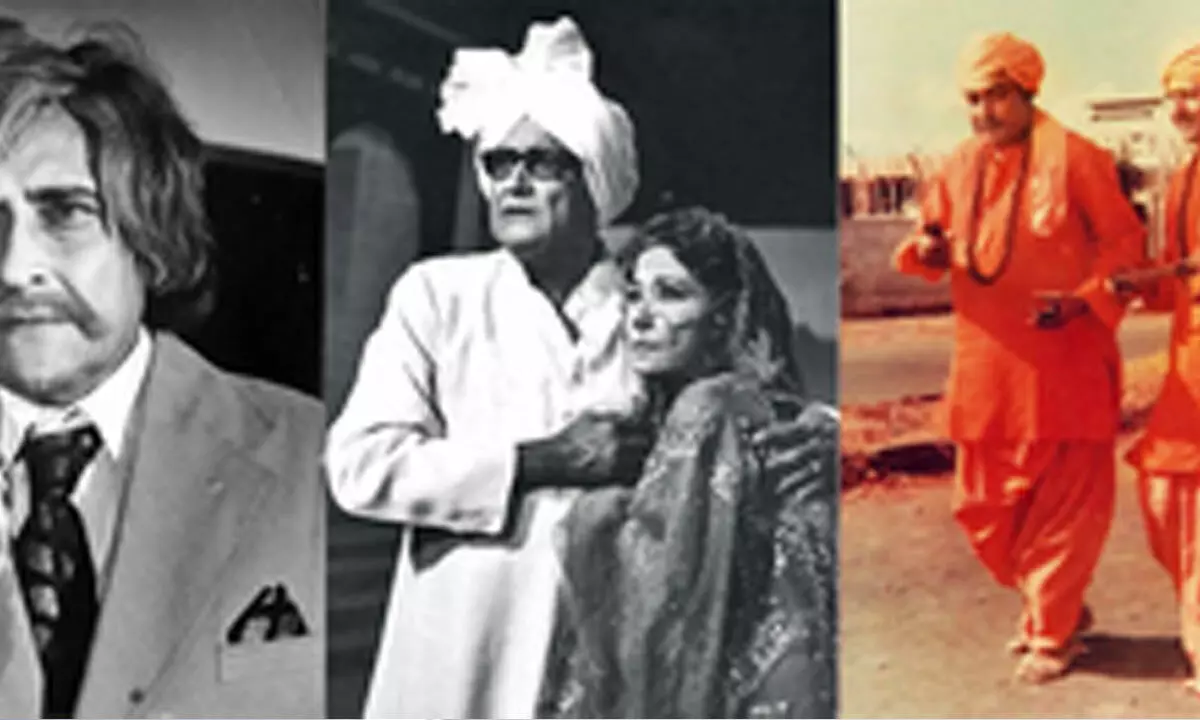Live
- South Sudan targets 300,000 vulnerable people in new cholera vaccination drive
- Lal Bahadur Shastri Death Anniversary 2025: Honouring India’s Second Prime Minister and His Inspiring Words
- Pongal 2025: Celebrating Four Days of Gratitude, Harvest, and Togetherness
- The Countdown Begins: Ramayana: The Legend of Prince Rama Trailer Out Now
- AP to Attract ₹10 Lakh Cr Investment in Green Energy; Chandrababu
- Shiva, Sachin enter quarterfinals of men’s Boxing Nationals
- Clop lacks context, says DIG after video on conception lecture to schoolgirls goes viral
- Kolkata Police investigate Bengal-based NRIs abroad with fake Indian passports
- Chandrababu extends Sankranti greetings to Telugu people
- Piyush Goyal urges cleantech sector to go for self-sustaining innovations
Just In
Ashok Kumar: Indian cinema's versatile actor - whose hit film drew the ire of Morarji Desai

From 1936 to 1996, there was no year when a Hindi film with him as the hero -- or a key supporting character or even a cunning villain -- did not hit the big screen.
New Delhi: From 1936 to 1996, there was no year when a Hindi film with him as the hero -- or a key supporting character or even a cunning villain -- did not hit the big screen. He was also seen frequently on the small screen every week in the mid-1980s as the wise patriarch, summarising every episode of Indian TV's first soap opera 'Hum Log', often with a homespun witty Hindi quip or poem.
Apart from his versatile acting, Ashok Kumar is also associated with the first patriotic hymn in a Hindi film -- 'Jai Jai Janani Janmabhoomi' in 'Janmabhoomi' (1936), followed by the more directly nationalistic 'Aaj Himalay Ki Choti Se...' in 'Kismet' (1943) with its refrain '..Door hato duniyawalon, Hindustan hamara hai'. Unbelievably, this was cleared by the British censors, perhaps due to the phrase 'German ho ya Japani', but as it began to be played over and over again in cinemas on public demand and sung by freedom fighters, it faced curbs by the colonial authorities.
And then, his spy thriller 'Samadhi' (1950) become the first Indian film to feature Netaji Subhas Chandra Bose and the Indian National Army.
Ashok Kumar was, however, not always a positive presence -- onscreen, that is.
One film, where he played the protagonist with dark grey shades, who leaves the police cutting a most sorry figure, led to policemen on streets being taunted by film viewers to do the same with them as Ashok Kumar did in the film, and earned a summons from Bombay Home Minister -- and later Prime Minister -- Morarji Desai.
The actor was peremptorily asked to withdraw the film -- running to packed houses for 15 weeks -- if he did not want to be arrested, and play a police inspector in his next cinematic appearance. 'Sangram' (1950) was subsequently banned in the state.
Born on this day (October 13) as Kumudlal Ganguly, Ashok Kumar (1911-2001) was capable of infinite variations.
In his over six-decade-long career, he appeared in 340-odd films and TV serials, playing a haunted lover, conman sadhu, the second and the last Mughal emperors, an idealistic doctor who ends up killing a molester, a judge accused of murder, a ribald public prosecutor, the compassionate man, usually a nawab, who gives up the heroine to her earlier (hidden) paramour, the irrepressible criminal planner of 'Bada Kabutar' (1973) and an all-round problem solver -- at whose home even Amitabh Bachchan drops in for tax advice -- as the flamboyant Colonel Julius Nagendranath Wilfred Singh in 'Chhoti Si Baat' (1976).
However, his path to becoming an enduring Indian actor was nothing short of a film story itself.
Born in a family of prominent lawyers with his father having been a hostel roommate of future President Rajendra Prasad, he was expected to take up the same profession but instead, he chose to join the fledgling Hindi film industry -- though behind the scenes.
Throwing up his law course, he had come to Bombay in 1934, seeking Bombay Talkies owner Himanshu Rai's endorsement to go to Germany's famed UFA studios. However, Rai convinced him to stay at the studio where his brother-in-law Sasadhar Mukherjee was a sound technician.
All changed when the male lead of 'Jeevan Naiya' eloped with Rai's wife and his film co-star Devika Rani. While she was coaxed back, the male hero was dismissed. A distraught Rai saw him, then a lab technician and film editor, smoking outside, something clicked, and he ordered him to take over as the hero.
The film's German director Franz Osten was not happy to take him on but Rai overruled him despite the reluctant hero, rechristened Ashok Kumar, muffing up a simple scene with the heroine in his first-ever take, and then, leaving the villain with a fractured leg.
From this rather unpromising start, Ashok Kumar went on to establish himself as Hindi cinema's first superstar, but ceaselessly soliciting feedback to sharpen his performances, even, as he brought a natural approach and willingness to reinvent himself. At the appropriate time, he moved on to playing supporting roles in line with his age -- without ever getting typecast. He, then, went on to become a TV superstar and narrator in the 1980s.
And Raj Kapoor, Dev Anand, Pran, Madhubala, Lata Mangeshkar, (youngest brother) Kishore Kumar, Hrishikesh Mukherjee, B. R. Chopra, as well as Bimal Roy and S. D. Burman were among those whom he gave a break or otherwise, helped rise in the Bombay film industry.
He was as versatile in his life -- being an accomplished painter, (self-taught) chess player, astrologer, and limerick composer, spoke eight languages, and was an authorised practitioner of homoeopathy, who reportedly cured a teenage girl facing amputation of a leg.
Ashok Kumar is also credited with introducing rap to India, with 'Rail Gaadi' in 'Aashirwad' (1968).

© 2025 Hyderabad Media House Limited/The Hans India. All rights reserved. Powered by hocalwire.com






